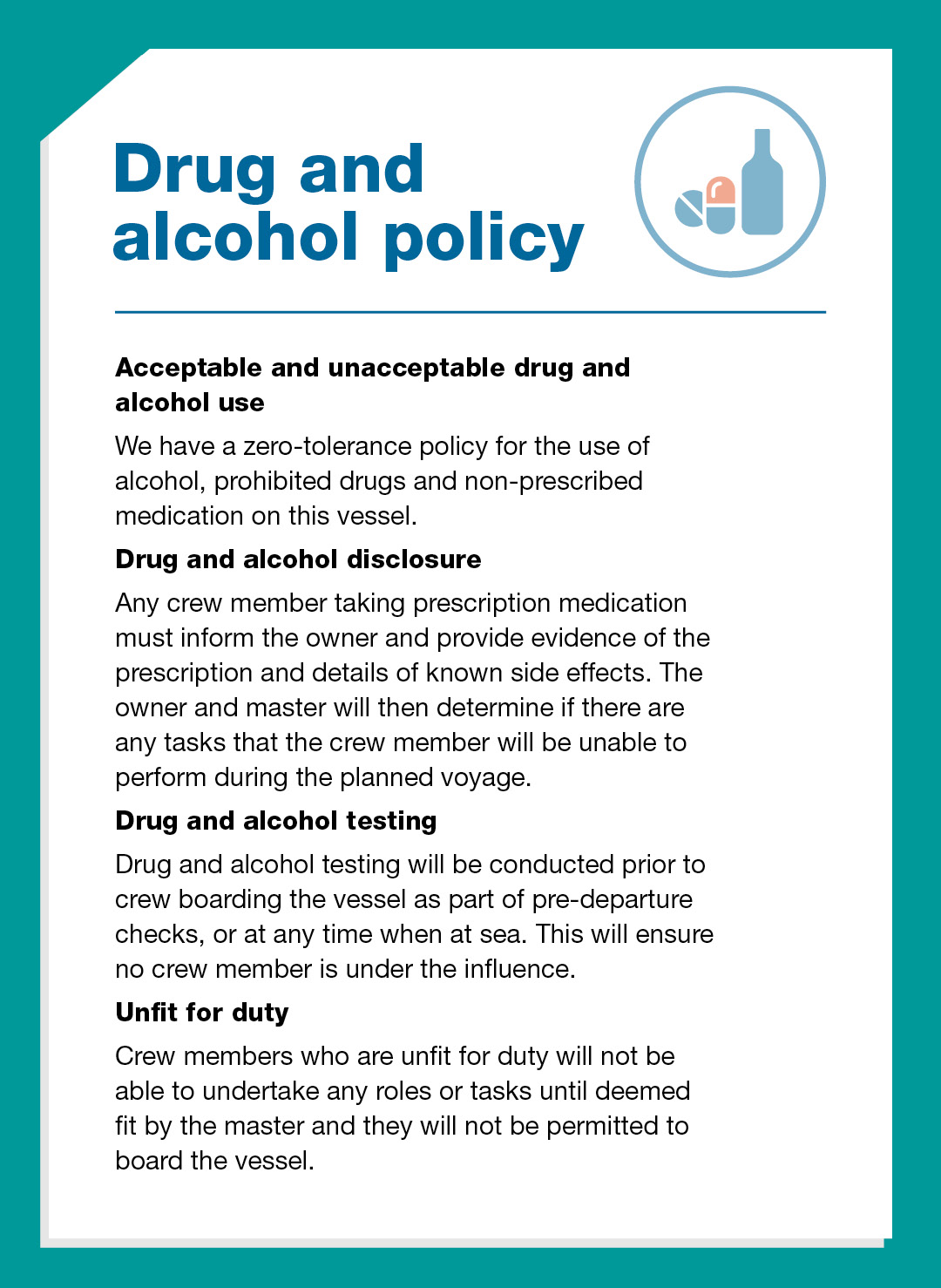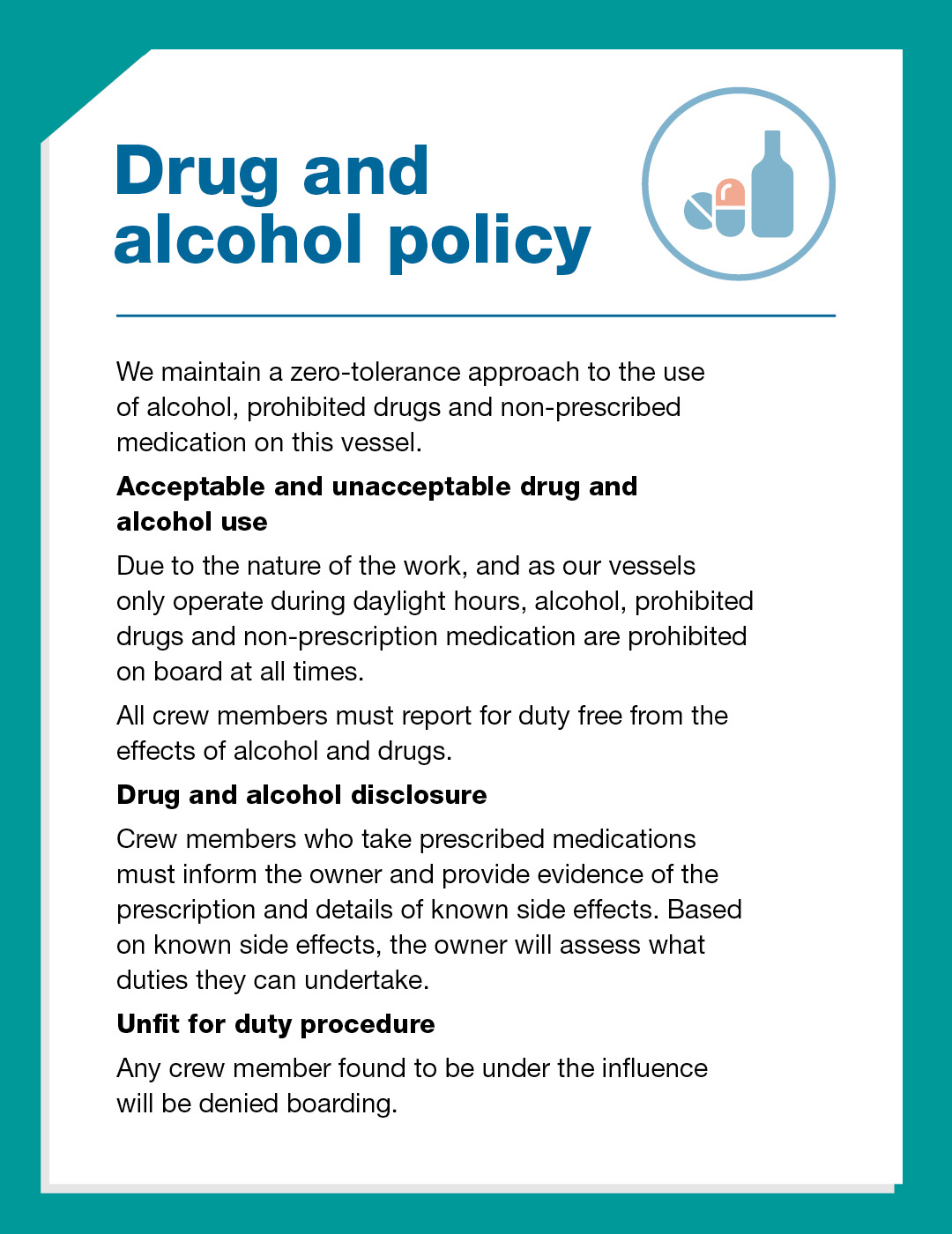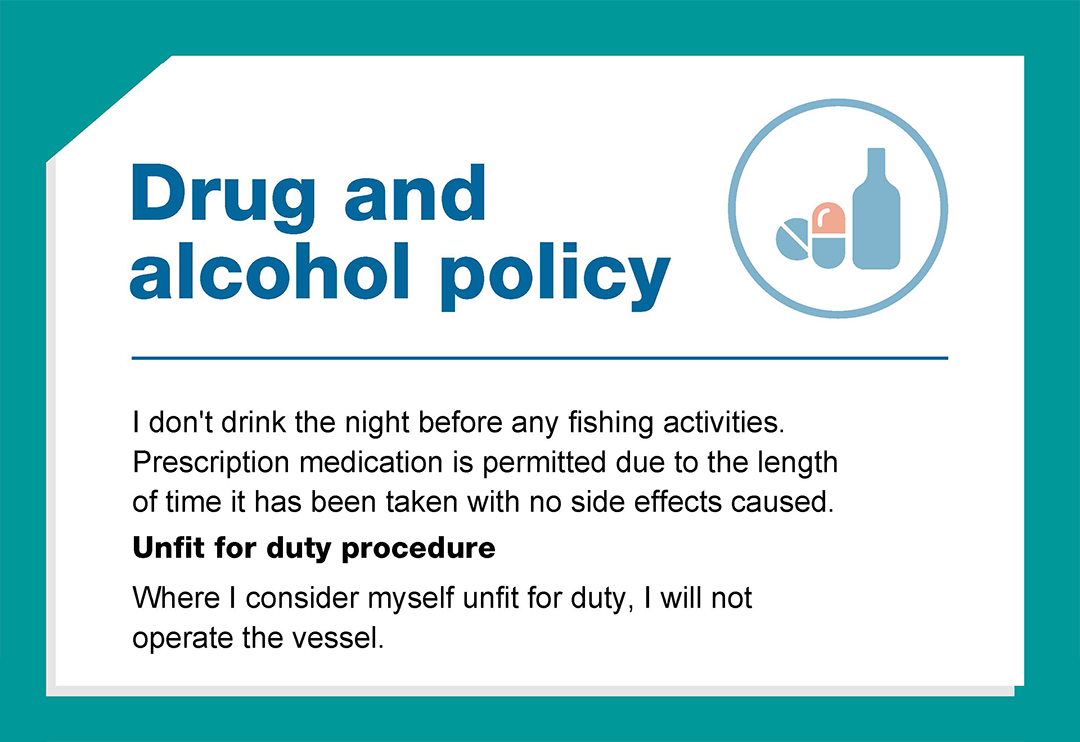Drug and alcohol policy - Class 1, 2 and 3
New requirement: Include a drug and alcohol policy in your SMS.
Applies to: Class 1, 2 and 3 vessels. There’s different guidance for Class 4 (hire and drive) vessels.
Comes into effect: 1 June 2025.
On this page:
- Overview
- How to develop a drug and alcohol policy
- Scenarios with examples
- Q & A
- Webinar
- Useful resources
- Contact
Overview
From 1 June 2025, all domestic commercial vessel (DCV) operators must have a policy outlining how they manage the risks of drugs and alcohol included in their safety management system (SMS).
AMSA introduced this change to address the safety risks associated with drug and alcohol use.
It is important that all masters, crew and special personnel:
- are made aware of your drug and alcohol policy
- are assessed as fit to undertake their duties
- are not impaired by drugs or alcohol.
Operators of passenger-carrying vessels are also required to include a policy outlining how they manage the risks of drugs and alcohol for passengers.
How to develop a drug and alcohol policy
Documentation: Develop your drug and alcohol policy as a document and store it in your SMS.
After developing your policy, you may need to update other documents in your SMS impacted by your drug and alcohol policy, such as:
- employee induction
- vessel operation procedures
- training.
Level of detail: The level of detail in your policy depends on the size and complexity of your operation.
A drug and alcohol policy for a solo operator or vessel operation eligible to use a simplified SMS may be a few sentences. A policy for a larger operation may require a bit more detail.
Follow these steps to develop a policy for the nature and complexity of your operation.
- Step 1: Educate
Start by learning about drugs and alcohol in the workplace. Refer to:
- guidance on drugs and alcohol e.g. from Safe Work Australia
- state/territory legislation on drugs and alcohol, including those covering possession, alcohol limits and use
- AMSA's guidance on work health and safety on DCVs.
- Step 2. Develop
The vessel owner should develop the policy in consultation with the master and crew.
Whatever your policy on drug and alcohol use, make sure you consider the risks to the crew’s ability to undertake their duties safely, including in an emergency.
Note: You must make sure your policy aligns with any state/territory legislation where the vessel is operating (see Step 1).
What to consider
The considerations below are just a starting point. Different considerations may apply to your specific vessel’s operation.
- Acceptable and unacceptable drug and alcohol use: Consider whether to have a ‘dry vessel’ where no alcohol, prohibited drugs or non-prescribed medication are allowed or whether to permit crew to have a limited supply of alcohol at the end of their work day. Where alcohol is allowed, consider how this will be managed and any impact it may have on crew ability to undertake duties in an emergency.
- Drug and alcohol disclosure: Consider whether to request crew members to inform you about any prescription medications they’re taking. This could be important to know in case there are any undesirable effects from the medication e.g. drowsiness. It will also enable you to have a full understanding of medications required in a medical emergency.
- Drug and alcohol testing: Consider whether to conduct drug and alcohol testing prior to crew boarding the vessel as part of pre-departure checks.
- Unfit for duty/under the influence: Consider how you will manage a situation where the master or a crew member is determined to be under the influence of drugs or alcohol and unfit for duty.
- Step 3. Trial
Trial your policy for 1-2 months to identify and address any problems. Then ask:
- How well is the policy working?
- Is anything missing or does it need amending?
- Step 4. Monitor, review and revise
Once the initial policy has been developed and trialled and you’re sure it’s fit for purpose, you can implement the policy into your SMS. We recommended that you review it:
- annually to reflect any changes in legislation, best practices or improvements you identify
- after any marine incident
- as new medications are prescribed to crew members
- as new medical conditions arise among crew members.
Make sure you stay informed about any new developments in drug or alcohol testing technology or legal requirements that may affect your operations.
- Step 5. Instruct and train
Induct all existing and joining crew on your drug and alcohol policy.
Conduct regular training sessions and meetings with the master and crew to help reinforce the policy and ensure that all crew understand their responsibility the importance of sticking to it.
Download or print and share: How to develop a drug and alcohol policy - Class 1, 2 and 3 vessels PDF251.25 KB
16m Class 3B fishing vessel
The owner and master of a 16m Class 3B fishing vessel have determined that they will operate a dry vessel – this means no prohibited drugs or non-prescription medication, and no alcohol.
They’ve developed a short, written policy which will be part of the crew induction. They’ve also included the policy in the ongoing procedures under the SMS.
The master and crew acknowledge their understanding of the new policy by signing the updated induction or training record.
- Image description: Drug and alcohol policy
Drug and alcohol policy
Acceptable and unacceptable drug and alcohol use
We have a zero-tolerance policy for the use of alcohol, prohibited drugs and non-prescribed medication on their vessel.
Drug and alcohol disclosure
Any crew member taking prescription medication must inform the owner and provide evidence of the prescription and details of known side effects. The owner and master will then determine if there are any tasks that the crew member will be unable to perform during the planned voyage.
Drug and alcohol testing
Drug and alcohol testing will be conducted prior to crew boarding the vessel as part of pre-departure checks, or at any time when at sea. This will ensure no crew member is under the influence.
Unfit for duty
Crew members who are unfit for duty will not be able to undertake any roles or tasks until deemed fit by the master and they will not be permitted to board the vessel.

7.4m Class 2D workboat
The owner of 7.4m Class 2D workboats has a contract to maintain the pylons of jetties within their local area. Each vessel operates with a minimum of 2 crew members, which may increase to 3 depending on the day’s work requirements.
These policies are included in the SMS. All crew members are required to acknowledge their understanding by signing the updated training record.
- Image description: Drug and alcohol policy
We maintain a zero-tolerance approach to the use of alcohol, prohibited drugs and non-prescribed medication on our vessels.
Acceptable and unacceptable drug and alcohol use
Due to the nature of the work, and as our vessels only operate during daylight hours, alcohol, prohibited drugs and non-prescription medication are prohibited on board at all times.
All crew members must report for duty free from the effects of alcohol and drugs.
Drug and alcohol disclosure
Crew members who take prescribed medications must inform the owner and provide evidence of the prescription and details of known side effects. Based on known side effects, the owner will assess what duties they can undertake.
Unfit for duty procedure
Any crew member found to be under the influence will be denied boarding.

4.6m Class 3D fishing vessel
The owner is the sole operator of a 4.6m Class 3D fishing boat, operating in a mud crab fishery in sheltered water limits. As a moderate drinker and user of prescription medication they adapt their policy to suit their operation.
- Image description: Drug and alcohol policy
I don't drink the night before any fishing activities. Prescription medication is permitted due to the length of time it has been taken with no side effects caused.
Unfit for duty procedure
Where I consider myself unfit for duty, I will not operate the vessel.

Q & A
Webinar
Watch a recording of the safety management system requirements webinar, presented on 19 March 2025. We discussed drug and alcohol policy requirements and answered questions from industry.
Useful resources
- Stay Afloat - Worried about the drug, alcohol or other substance use of a worker or colleague? You can get in touch (or put them in touch) with Stay Afloat – The Seafood Industry National Mental Health and Wellbeing program.
- Sea Safe - Changing your alcohol and drugs policy may be uncomfortable for some workers. For advice on ways to further support this behaviour change, get in touch with Sea Safe – The National Seafood Industry Safety Culture program.
Contact
Got a question about this requirement? Please contact us.
See what other updates you need to make to your SMS before 1 June 2025.